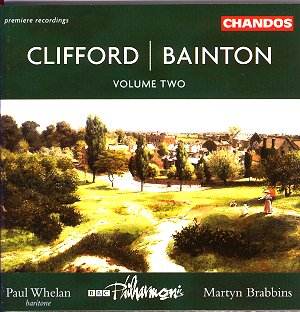|
Released: January 13, 2003
CHANDOS CHAN 10019 2003 [76:02]
Recorded: Studio 7,
New Broadcasting House,
Manchester.
October 2001
The orchestral Scherzo Epithalamion after Spenser, completed in 1929, is very much the product
of its time. It is also – and most importantly, I think – a splendid piece of music that should have firmly placed
its composer on the British musical map along with, say, Bax and Bridge. This superbly crafted work displays a remarkable
orchestral mastery made clear in the very first bars of the scherzando introduction. This is sustained, almost effortlessly,
throughout alongside a not inconsiderable melodic gift. This gift is evident from the marvellous theme on trumpets and horns
heard immediately after the scurrying introduction. This is the kind of thing that Bax and Bridge could have written (e.g.
the latter’s rhapsody Enter Spring). Bainton’s Second Symphony (on Chandos CHAN 9757) is a full-blooded
Romantic utterance of some considerable substance, though fairly traditional in its aims and means. In Epithalamion,
Bainton demonstrates that he was not hostile to Impressionism either, for here is music of great melodic and harmonic refinement.
This is by far the finest work in this release and one may keep wondering how on earth such music as this has remained unheard
for so many long years. An English Idyll was composed several years after the completion of the Second Symphony
when the composer was still living n Australia. The former critic of the Manchester Guardian, Sir Neville Cardus, spent
the war years in Australia, and he too must have felt some nostalgia for England. He wrote these poems (apparently the only
ones he ever wrote) to be set by Bainton who most likely shared the same feelings. The resulting piece is a perfect example
of what a gifted composer can do with words of little literary distinction. Cardus’s words, as far as I am concerned,
are a bit too much of the Ye Olde England sort of thing and rather dated. Bainton, however, clothes them with some
really fine, beautifully nostalgic music although he falters in the attempted evocation of the bustle around Piccadilly Circus.
He nevertheless finds the right notes for the beautiful third section Cathedral in which he quotes the plainchant hymn
Vexilla regis to great effect. A most welcome rarity, though, well worth more than the occasional hearing.
Clifford’s powerfully impressive Symphony 1940 (also on Chandos CHAN 9757) gives ample
proof of the composer’s symphonic potential and establishes his credentials as a ‘serious’ composer. In
many respects, Clifford’s career is not unlike that of Arthur Benjamin, a most distinguished composer, whose reputation
nevertheless (and somewhat regrettably) rested on lighter works such as the ubiquitous and popular Jamaican Rumba,
Cotillon Suite or North American Square Dance Suite. But he too wrote a substantial symphony towards
the end of World War II, several worthy operas and some more serious orchestral works such as his beautiful Ballade
for strings. Clifford also composed some lighter works such as the colourful A Kentish Suite (film music without
the film, dixit Lewis Foreman) or the exquisite Five English Nursery Tunes. Superior light music of great
charm and superbly scored, to be enjoyed for all it is worth. The short Casanova Melody (edited by Rodney Newton)
is a trifle from the additional music composed for Carol Reed’s celebrated film The Third Man. On the
other hand, the miniature tone poem Shanagolden inspired by a trip to Ireland and the place where his grandmother
died may call Moeran to mind but is a real gem.
Martyn Brabbins conducts committed readings of these unjustly neglected works that should appeal to anyone
wanting to explore some of the forgotten byways of the British Musical Renaissance
notes from a review by Hubert Culot
see also a review by Rob Barnett
|
 |
|

|
| CHANDOS CHAN 10019 2003 |
Edgar Bainton (1880 – 1956)
Epithalamion (1929)
An English Idyll (1946)a
Hubert Clifford (1904 – 1959)
A Kentish Suite (1935)
i Dover
ii Choral Prelude on Canterbury
iii Pastoral Folk Song
iv Scherzo, Gads Hill
v Greenwich
The Casanova Melody (1949)
Five English Nursery Tunes (1941)
Shanagolden (1953)
|
 |
|
|
 |
|
|
|

